#Macmillan Company
Text

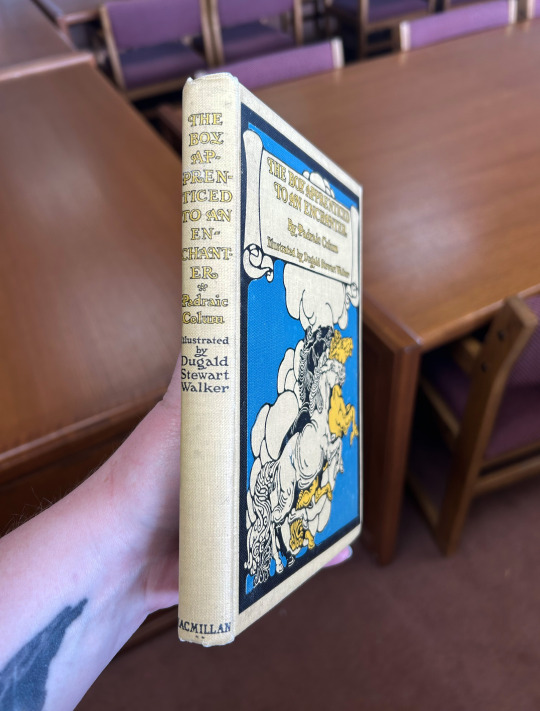


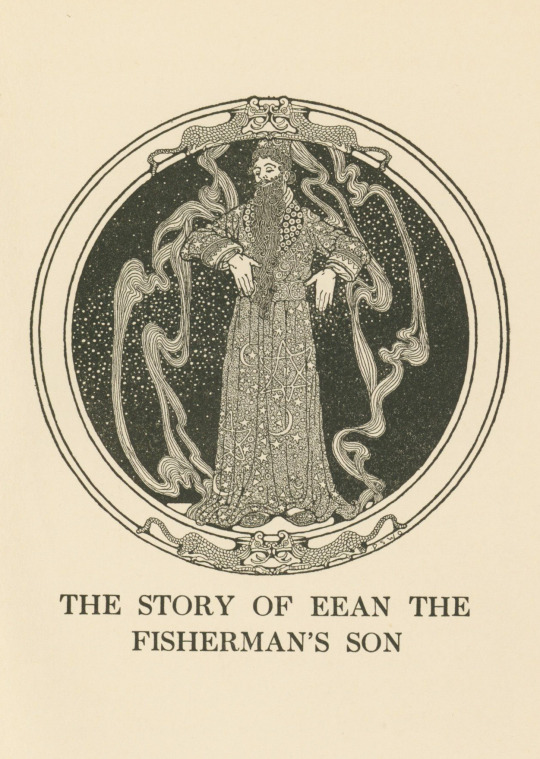
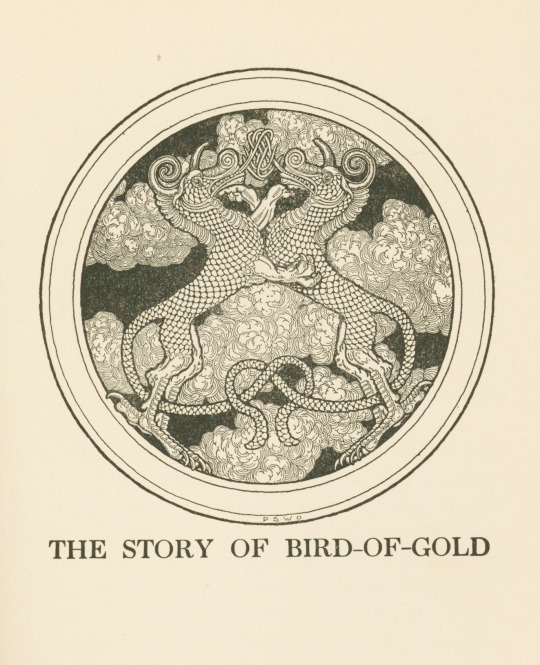

Publishers' Binding Thursday
I found this week's Publishers' Binding Thursday selection while simply browsing the stacks. I noticed the spine first, and when I pulled the book out saw the three, bright, galloping horses on the cover. The book is The Boy Apprenticed to an Enchanter by Irish poet, author and folklore collector Padraic Colum (1881-1972). It was published by the Macmillan Company in 1920 with illustrations by American illustrator Dugald Stewart Walker (1883-1937). This book is part of our Historical Curriculum Collection of children's books.
The cover is a cream bookcloth with blue, yellow, and black color stamping. A white horse, a yellow horse, and a black horse rear up as a cloud of dust rises behind them on a blue background. The title is in a cream banner at the top and is stamped in yellow with a black outline. The title, author's name, and illustrator's name are stamped on the spine, with the publisher stamped at the bottom.
View more Publishers' Binding Thursday posts.
-- Alice, Special Collections Department Manager
#Publishers' Binding Thursday#The Boy Apprenticed to an Enchanter#Padraic Colum#Macmillan Company#Dugald Stewart Walker#color stamping#publishers' bindings#horses#illustrations#children's books#Historical Curriculum Collection
61 notes
·
View notes
Text





Book 203
Great Prints of the World
Gabor Peterdi
Macmillan Company 1969
This is one of those books that I don’t understand why I have it until I open it up. The image reproductions are simply superb. With examples from most every significant printmaker from Antonio Pollaiuolo (1429-98) through Picasso, it’s a wonderful overview. The only real problem with it is that it’s almost entirely in black-and-white.
#bookshelf#illustrated book#library#collection#personal library#personal collection#books#book lover#bibliophile#booklr#great prints of the world#gabor peterdi#Macmillan company#art
0 notes
Text


1940 Studies in Sherlock Holmes plaque
#love that they have no clue what the origin of this plaque is lmao#acd#vincent starrett#studies in sherlock holmes#221b vincent starrett#arthur conan doyle#sir arthur conan doyle#the baker street irregulars#the macmillan company#murray hill hotels#commemorative plaque#Sherlock Holmes#Holmes
19 notes
·
View notes
Photo

Tito Lucrezio Caro, De rerum natura, II, (114-124), Edited by Armando Fellin, UTET, Torino, (1963-)2004, p. 138 (1893 Macmillan and co. Edition here)
«Osserva infatti, ogni volta che raggi penetrati infondono la luce del sole nell'ombra delle case: molti minuti corpi in molti modi, attraverso il vuoto vedrai mescolarsi nella luce stessa dei raggi, e come in eterna contesa attaccar battaglie e zuffe, a torme contendendo, e non far sosta, da aggregazioni e disgregazioni frequenti travagliati; sì che da ciò puoi figurarti quale sia l'eterno agitarsi dei primi principi delle cose nel vuoto immenso; almeno per quanto una piccola cosa può dare un modello di cose grandi e vestigi di loro conoscenza.» – Tito Lucrezio Caro, De rerum natura, II, (114-124), Edited by Armando Fellin, UTET / De Agostini Libri, Novara, 2013
#graphic design#philosophy#poetry#book#lucrezio#tito lucrezio caro#titus lucretius carus#armando fellin#utet#unione tipografico editrice torinese#de agostini libri#the macmillan company#1890s#1960s#2000s#2010s
43 notes
·
View notes
Photo

UK 1985
#UK1985#MACMILLAN PUBLISHING COMPANY#EDUCATIONAL#ACTION#TRIVIA#PARTY GAME#SPECTRUM#BBC#ELECTRON#QUIZTIMER#SPACE SCAN#CASTLES AND CLOWNS#THE SUNFLOWER NUMBER SHOW#SNAPPLE HOPPER#TOPS AND TAILS
10 notes
·
View notes
Text
Chapter 18, Neptune and the Sea-Gods
PART I
In the days when the Titans ruled the universe, Oceanus with his wife Tethys, controlled all the lakes, rivers, and seas; but when the Titans were overthrown, Neptune took possession of this great kingdom, and old Oceanus reluctantly gave up his dominion over the waters of the Earth. Though anxious to assert his supreme authority, Neptune allowed some of the descendants of the Titans to keep their small kingdoms, on condition that they own allegiance to him as their ruler. Among these was Nereus, son of Oceanus, who was celebrated for his vast knowledge, his gift of prophecy, and his love of truth and justice. He and his wife Doris (also a child of Oceanus) had fifty daughters called Nereids,47 and they were so beautiful that Neptune chose one of them, named Amphitrite, for his wife. There were two others of the Nereids who became famous: Galatea beloved by the Cyclops Polyphemus,48 and Thetis, the mother of Achilles; but none of them equaled Amphitrite in beauty.
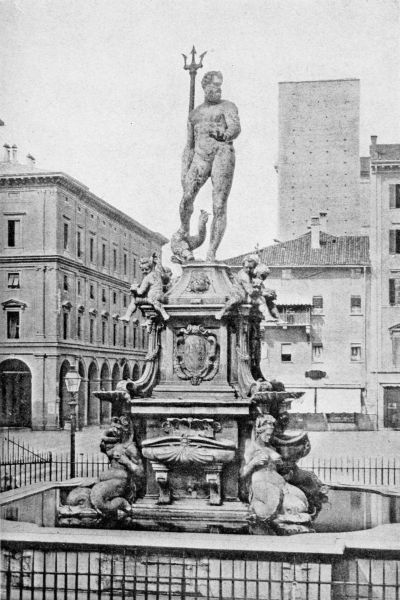
When Neptune first went wooing the Nereid, she was frightened by his formidable appearance, for he drove in a chariot drawn by huge sea-horses with brazen hoofs and golden manes; and the god himself carried his terrible trident, or three-pronged spear, with which he shatters rocks, and commands the storms, and shakes the shores of earth. None knew better than Amphitrite the extent of Neptune's power, for she had often watched him, when a storm was at its height, raise his all-compelling trident, and immediately the waves would cease raging and there would be a great calm. Sometimes she saw a ship, doomed by the sea-god to disaster, gliding confidently in quiet waters, when all at once a fierce storm would break over its head; and the hapless sailors, as they breasted the angry waves, would pray vainly to Neptune for the help that would never come. Many a good ship had nearly gained her port when
154"He spake and round about him called the clouds
And roused the ocean—wielding in his hand
The trident—summoned all the hurricanes
Of all the winds, and covered earth and sky
At once with mists, while from above the night
Fell suddenly."
Odyssey, Book V, line 348, Bryant's trans.
When Amphitrite saw this imposing-looking god driving toward her, she was frightened by so much splendor, though she could not help admiring Neptune himself with his sea-green beard, and his long flowing hair crowned with shells and seaweed. Since the enamored god could never come near enough to plead his suit, he sent one of his dolphins to do the wooing; and this was so successful that the fair Nereid was persuaded to become Neptune's wife, and share his golden throne in the heart of the sea. To reward the dolphin for its skill in having won for him his much-desired bride, Neptune placed it in the sky, where it forms a well-known constellation.
Though Neptune had undisputed control over all the waters of the earth, and over all that moves through the paths of the sea, he once aspired to greater power, and even plotted to dethrone Jupiter. But the ruler of gods and men discovered his wicked plans, and to punish him deprived him of his kingdom for some years, during which time he was obliged to submit to the humiliation of serving Laomedon, king of Troy. It was while he was in service here that he sought Apollo's help in building the wall of Troy, whose stones fell into place under the spell of the sun-god's music.49 Laomedon had promised Neptune a large reward if the wall was built within a certain time; but when it was finished,155 he refused to pay the sum agreed upon. Though angered at this treachery, Neptune had to endure the king's injustice until his years of service were over; but as soon as he was restored to his former power, he created a terrible sea-monster, which spread terror and death over all the land. Not knowing how to meet this calamity, the Trojans consulted an oracle, and were advised to sacrifice to the monster a beautiful maiden each year; and so prevent the wrath of Neptune from overwhelming the whole country in disaster.
Reluctantly the sorrowing people prepared to obey the oracle; and a victim was chosen by lot, and led by the priest to a large rock on the seashore, where she was securely chained. Then the hideous sea-beast glided out of its cave in the slimy rocks and devoured her. Each year this terrible ceremony was repeated, and at last the lot fell upon Hesione, the king's only daughter. Laomedon tried in vain to save her, but the lot was cast, and nothing could avert the appointed sacrifice. In despair, the wretched father saw the fatal hour approaching; and when the day drew near when Hesione was to be led down to the sea, he forgot his avarice and proclaimed throughout the land that a great reward would be given to any one who could slay the monster. Hercules appeared just in time to save the doomed maiden, and killed the monster with his oaken club as it was156 dragging Hesione into its cave. The king was overjoyed at his daughter's rescue, and told Hercules that he might claim the reward; but even when he saw the hero come with the beast's head as a proof that he had slain it, he refused to part with his much-loved gold. So Hercules returned home, but he did not forget Laomedon's perfidy; and when later on he came again to Troy, he killed the king and took his children captive to Greece.50
Neptune, like all the immortals, loved more than once; and among those who shared his affections was a maiden named Theophane, who had so many suitors that it kept the jealous sea-god in constant fear lest she should prefer some earthly lover. So he took her to the island of Crumissa, and there changed her into a sheep, while he carried on his wooing in the form of a ram. The offspring of this marriage was the famous golden-fleeced ram, whose pelt was the object of that ill-fated expedition made by Jason and his fellow Argonauts.
Neptune also loved the goddess Ceres, and followed her during the long time that she spent in search of her daughter Proserpina. Ceres was angered by the sea-god's persistent wooing, and hoping to escape from him, she took the form of a mare; but Neptune was not so easily discouraged, for he changed himself into a horse and contentedly trotted157 after her. The child of this strange pair was Arion,51 a wonderful winged steed that had the power of speech, and was of such incredible swiftness that nothing could ever equal it in speed.
The most famous children of Neptune and Amphitrite were Triton and Proteus. Triton was his father's trumpeter, and at Neptune's command he blew upon his conch-shell to calm the restless sea. His body was half man and half fish, and he gave the name of Tritons to all his male descendants, who, with the Nereids and Oceanides (daughters of Oceanus), followed the chariot of Neptune when he went abroad to view his kingdom. Proteus had charge of the great flock of sea-calves which fed on the soft seaweed and basked in the warm sands near his cave. He was celebrated for his wisdom and for the truth of the answers that he gave to those fortunate enough to make him speak. Homer calls him "the Ancient of the Deep whose words are ever true"; but his knowledge was not easy to obtain, for he had the extraordinary power of assuming any shape he pleased, and only those mortals gained his advice who persistently clung to him through his many bewildering changes.
158"When the climbing sun has reached
The middle heaven, the Ancient of the Deep,
Who ne'er deceives, emerges from the waves,
And, covered with the dark scum of the sea,
Walks forth, and in a cavern vault lies down.
The sea-calves from the hoary ocean throng,
Rank with the bitter odor of the brine,
And slumber near him. Then ye must exert
Your utmost strength to hold him there, although
He strive and struggle to escape your hands;
For he will try all stratagems, and take
The form of every reptile on the earth,
And turn to water and to raging flame.
* * * * *But hold him fast, until the aged seer
Is wearied out in spite of all his wiles,
Then question him."
—Bryant's Homer's Odyssey, Book IV, line 518.
PART II
Aristæus was the son of Apollo, and the water-nymph, Cyrene. Beside tending his flocks and herds, he took care of the olive trees and vineyards, and was a famous keeper of bees. He was very proud of his hives, and the swarm of bees increased each year under the guidance of his skillful hands; but one day he found hundreds of the bees lying lifeless beside the hives, and on the morrow there were still more among the dead. Not knowing how to account for this disaster, Aristæus hurried to his mother to ask her help in saving the few bees that remained. Cyrene lived under a mountain stream;159 and, hearing that her son wished to speak to her, she commanded the river to divide and form a wall on either side, so that Aristæus might walk in dry places. When the youth told her of the tragedy befalling his hives, she could not help him, but bade him go to old Proteus, for he alone could tell what the trouble was and find a remedy. She warned Aristæus of the difficulty in holding the Ancient of the Deep when he tried to bewilder and terrify the stranger by rapidly assuming different forms; and she bade him remember that he must keep the sea-god fast bound if he would receive the wished-for answers. Then she led him to the cave of Proteus and hid him there, exhorting him to be bold and fearless.
At noon the Wizard of the Deep came up out of the sea, followed by his herd of sea-calves; and while they lay stretched out on the warm sands, the god sought the retreat of his cave and soon was in a deep slumber. When Aristæus saw Proteus fast asleep, he stepped cautiously up to him and bound him with strong fetters. The god woke with a start, and tried to shake himself free of his chains; but on finding that he was a prisoner, he resorted to all the trickery that he could command. He became a fire, a flood, a wild beast, a horrible serpent, and many other forms calculated to terrify the beholder. But Aristæus was not afraid, and soon the160 old wizard realized that he must submit; so he assumed his own shape, and asked the youth what it was that he wished to know. The son of Cyrene told him of the death of his bees, and begged for some remedy. Then Proteus reminded him of how he had been the real cause of Eurydice's death, by making her flee from him in such haste that she did not see the snake at her feet.52 The wood-nymphs, who were Eurydice's companions, had therefore wished to punish Aristæus, and had sent this destruction to his hives. It was necessary to appease the wrath of the nymphs; and to do this Proteus bade the youth build four altars, and sacrifice on them four bulls and four cows of perfect form and size. This burnt-offering was to placate the nymphs, and when it was made, he must pay funeral honors to Orpheus and Eurydice to pacify their anger against him. At the end of nine days he was to return to the grove where he had made the sacrifices.
Aristæus thanked the Ancient of the Deep for his wise words, and after releasing him from the fetters, hurried away to do as Proteus had advised. The sacrifices were made, and suitable honors paid to the dead; and then, after waiting impatiently for nine days, Aristæus went back to the grove. To his great joy he found that a swarm of bees had taken possession of the carcasses, and that he was now the161 owner of a much larger number than he had ever had before.
PART III
One of the many sea-gods who ruled under Neptune was Glaucus, who was once a poor fisherman, and earned his living by selling the fish that he caught each day. One morning he had an extra large haul; and when he threw the fish on the ground beside him, he noticed that they were eagerly nibbling the grass that grew very thickly in the spot where he had flung his net. As he stood watching them, the fish suddenly leaped up from the ground; and having flopped back into the water, swam away. Curious to see whether it was the grass that gave them this extraordinary power, Glaucus chewed a bit of it himself, and immediately he felt an irresistible desire to plunge into the sea. Fearlessly he dived beneath the waves, and soon found no difficulty in keeping under water, for the ocean seemed now to be his native element. He saw his beard turning a lovely sea-green; and he found that his hair, grown suddenly long and green, was trailing out behind him. His arms were azure-colored, and his legs became a fish's tail; but he felt no regrets over losing his human form, and stayed contentedly in the ocean. In time Neptune made him one of the lesser gods, and took him into the friendly fraternity of the sea.
162As Glaucus was swimming one day near the shore, he saw a beautiful maiden named Scylla; and fell so much in love with her that he forgot he was half fish, and begged her to be his wife. Scylla stared at his green hair and blue skin, but this did not frighten her, nor did she wonder at his fish's tail; for she had often played with the sea-nymphs, and was accustomed to their strange appearance. Glaucus felt encouraged by her behavior, and begged her to listen to the story of his life. He told her how he had suffered a sea change, and now occupied the lofty position of a god. The maiden was interested in this recital, but she had no desire to marry a merman, even if he were a god; so when Glaucus ventured to come nearer to her, she turned and fled. Discouraged but still determined, the young god sought the aid of the enchantress Circe, and begged her to give him some love-potion by which he might win the unwilling Scylla. Circe was so well pleased with the handsome sea-god that she urged him to accept her love, and forget the maiden who scorned him; but Glaucus would not yield to the persuasions of the enchantress, and kept pleading for the desired love-potion.
Seeing that she could not gain his affections, Circe determined that at least no one else should enjoy his love; so she refused to make the potion, and sent Glaucus angrily away. When she saw163 him go sorrowfully from her palace, she mixed a magic liquid, brewed from poisonous plants and deadly weeds, and this she poured over the waters where Scylla was wont to bathe. The maiden, suspecting no treachery, sought the ocean at her accustomed hour, and as soon as the poisoned waves touched her body she became a horrible monster with six heads—each having three rows of sharp teeth. She saw all around her serpents and barking dogs that were part of her own body, which had suddenly become rooted to the spot where she stood. She never regained her human form, but stayed in this place forever to terrify all mariners, and to devour the hapless sailors that came within her reach. Opposite her was the den of Charybdis, who three times a day swallowed the waters of the sea, and three times threw them up again. On the rock above the den was an immense fir-tree, and all ships that passed that way watched eagerly for this signal of danger, and prayed that they might safely steer between the double horrors of Scylla and Charybdis.
164"There Scylla dwells,
And fills the air with fearful yells; her voice
The cry of whelps just littered, but herself
A frightful prodigy—a sight which none
Would care to look on, though he were a god.
Twelve feet are hers, all shapeless, six long necks,
A hideous head on each, and triple rows
Of teeth, close set and many, threatening death.
And forth from the dark gulf her heads are thrust,
To look abroad upon the rocks for prey,—
.... No mariner can boast
That he has passed by Scylla with a crew
Unharmed."
—Bryant's Homer's Odyssey, Book XII, line 100.
PART IV
Two other minor deities of the sea were Leucothea and Palæmon. They were not born of the ocean-nymphs or any water-god, but were once mortals, named Ino and Melicertes. Ino was the wife of King Athamas, whom cruel Juno goaded into madness; and through fear of him Ino fled from the palace with her little son, Melicertes, in her arms. She hoped to reach some place of safety; but imagining herself pursued, in her frenzy she plunged from a cliff's edge into the sea. Neither she nor her son perished, however, for the gods, in pity for her sufferings, changed them both into ocean deities under the names of Leucothea and Palæmon. They were widely worshiped by all who had business in great waters, and their protection was invoked against the danger of shipwreck. A famous altar to Palæmon was built on the shores of Corinth, and in his honor were instituted the celebrated Isthmian games.53
PART V
Neptune was not only willing to befriend a goddess in distress, as he did when he raised the island out of the sea for Latona, but was equally ready to assist mortals—especially in their love affairs. Once he lent his chariot to a youth named Idas when he wished to elope with the maiden Marpessa, whose father had refused to allow the lovers to wed. They were overjoyed at Neptune's kindly offer of assistance; and on the day arranged for their flight, the happy pair mounted the chariot, and the swift steeds carried them far out of reach of Marpessa's angry father. When he discovered that his daughter had eloped with her lover, he started in pursuit; but finding it impossible to overtake Neptune's splendid horses, he flew into such a rage that he flung himself into a river and drowned. (The river was afterwards called by his name—Evenus.)
Knowing themselves out of reach of the irate father, the lovers continued their journey very happily, and believed that no misfortune could overtake them, when suddenly Apollo appeared before them, and, declaring himself in love with Marpessa, offered to fight Idas then and there for the possession of the maiden. Poor Idas felt that his chances for happiness were indeed ended, for how could a mortal contend with an omnipotent god? Suddenly166 a thunderbolt fell from the blue sky, and a voice declared that Marpessa herself should choose between her two suitors. The maiden looked at the glorious sun-god, and her heart beat fast at the thought of being loved by one so beautiful and young; but when she turned to Idas, she remembered that he was a mortal like herself, who would grow old as she grew old, and would, therefore, not cast her aside when her youthful charm was gone, as Apollo would be sure to do as soon as her beauty waned. So she held out her hand to Idas, and refused the sun-god's love. This choice was approved by Jupiter, and the lovers, happy once more, urged Neptune's swift horses over the mirror-like sea, which the kindly god had made calm as a forest pool on the softest summer day. In time they reached a pleasant land far from their native country, and here they lived happily ever afterward. The chariot, no longer needed, was sent back to Neptune with many thanks for his timely aid; and each year Idas and Marpessa burned as sacrifices to their protector a white bull, a white ram, and a white boar, which was the kind of offering most pleasing to Neptune.
#stories of old greece and rome#emilie kip baker#out of the northland#the macmillan company#1913#all rights reserved#copyright 1913#norwood press#J.s cushing co.#berwick & smith co#in the beginning#chapter I#chapter 1#page 1#page#1#saturn#cronos#rhea#cybele#ops#jupiter#jove#zeus#juno#hera#here#minerva#pallas#athene
3 notes
·
View notes
Text
If I've learned anything from researching how e-books really fucked shit up between libraries and publishers, it's that MacMillan sucks the most and can gargle my dick and balls
#also that vernor v autodesk destroyed any sense of digital ownership by letting companies use some ~*magic words*~#to they can say their products are licensed instead of sold to customers#fuck macmillan and autodesk in equal measure
1 note
·
View note
Text

A Treasury of Verse for Little Children
selected by M. G. Edgar
The MacMillan Company
New York
1908
Artist : Willy Pogany
The Owl and the Pussy-Cat
262 notes
·
View notes
Text

From our stacks: Illustration for "Sea Fever" from Rainbow Gold. Poems Old and New Selected for Boys and Girls By Sara Teasdale With Illustrations By Dugald Walker. New York: The Macmillan Company, 1927.
#sea fever#dugald walker#illustration#book illustration#book#books#old books#vintage illustration#library book#library books#rainbow gold#john masefield#detroit public library
442 notes
·
View notes
Photo

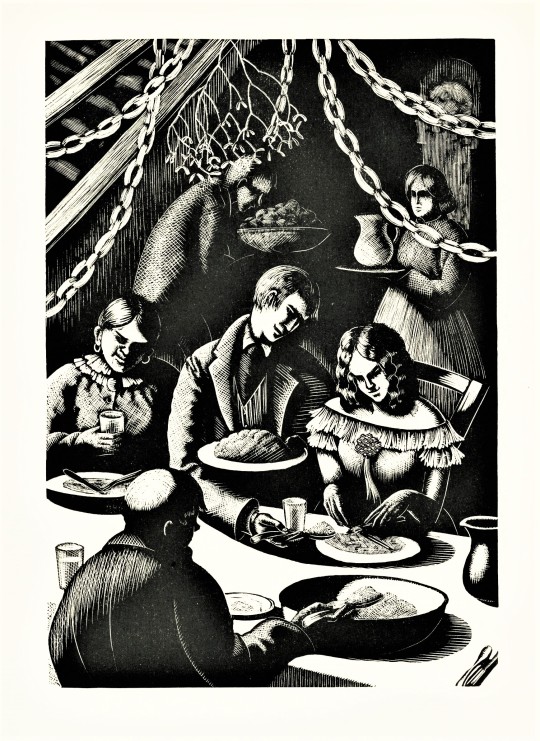
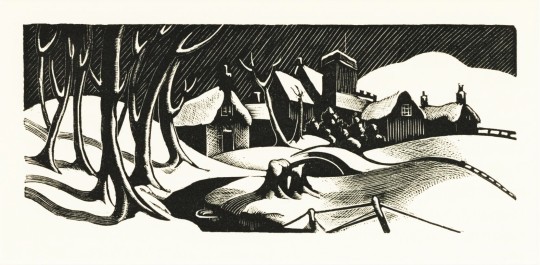


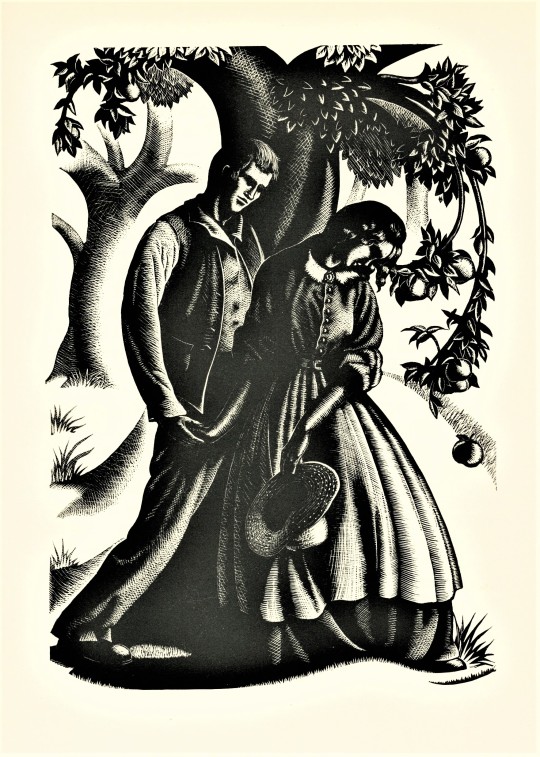
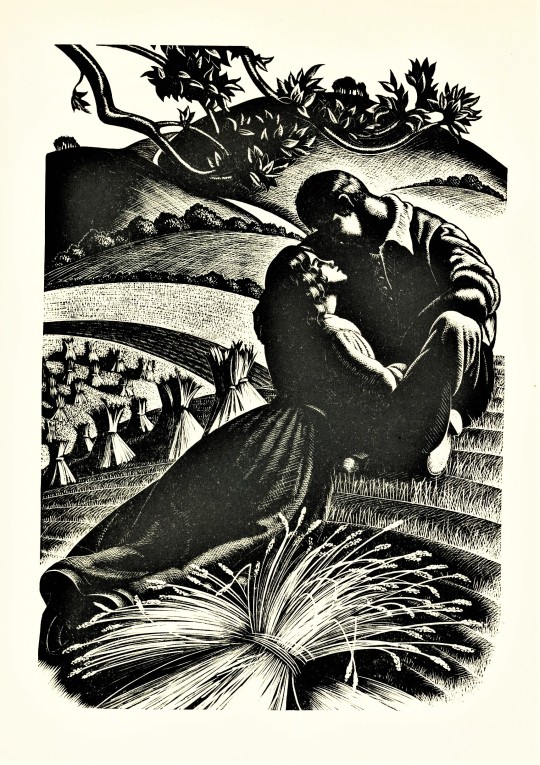
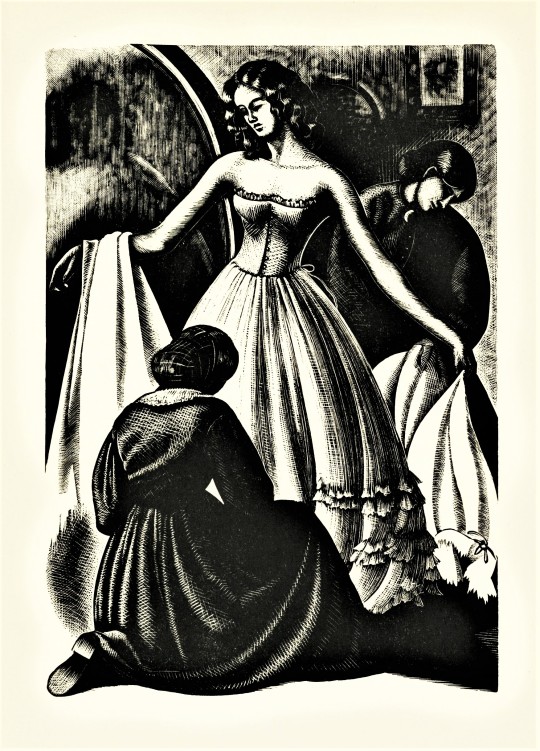
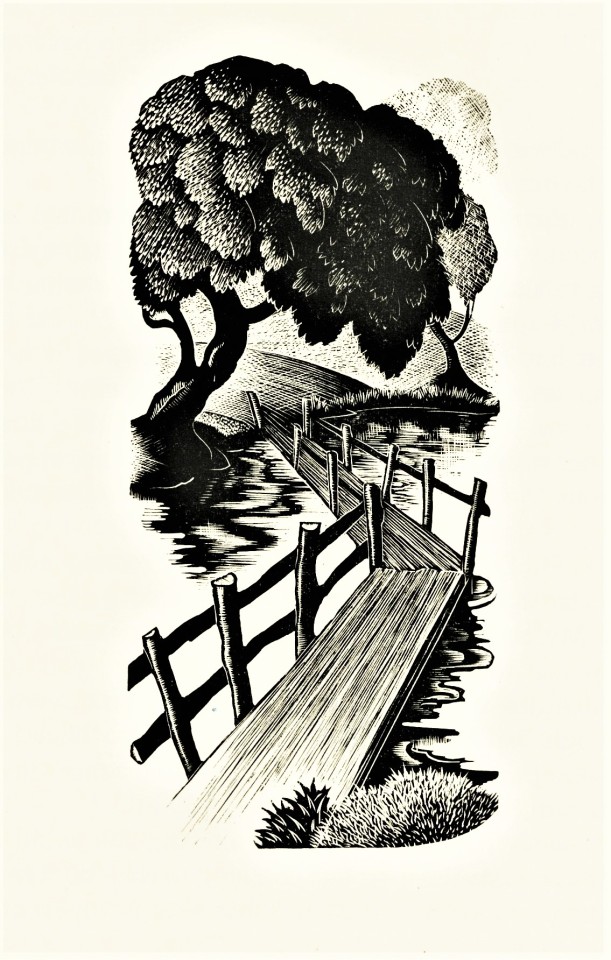

Wood Engraving Wednesday
CLARE LEIGHTON
We return once again to one of our favorite 20th-century wood engravers, the English/American artist, writer, and illustrator Clare Leighton (1898-1989), this time with engraved illustrations for Thomas Hardy’s novel Under the Greenwood Tree, printed by R. & R. Clark in Edinburgh and published in New York (and simultaneously in London) by the Macmillan Company in 1940. The text is from Hardy’s second novel originally published in 1872, and this edition was published to commemorate Hardy’s birth in 1840, for which Clare Leighton produced more than 60 engravings. Of Leighton’s work, the dust jacket notes declare:
Miss Leighton has won a place among England's outstanding artists: “a rural Rembrandt” is the title given her by Ernest Rhys, who, in the Observer, stresses “her uncanny mastery of light and shade.” Henry Seidel Canby, writing in The Saturday Evening Review of Literature, has remarked on “the great pictorial beauty of her extraordinarily strong and dramatic engravings.” She has been called “one of the finest of contemporary wood engravers.”
Both as artist and as one who knows intimately the country of Thomas Hardy’s novels, Miss Leighton has made this illustrated edition one which should appeal equally to art lovers and lovers of Hardy’s work.
The blurb isn’t wrong.
View more posts with work by Clare Leighton.
View more posts with work by women wood engravers.
View more Women’s History Month posts.
View more posts with wood engravings!
#Wood Engraving Wednesday#women's history month#wood engravings#wood engravers#women wood engravers#Clare Leighton#Thomas Hardy#Under the Greenwood Tree#R. & R. Clark#Macmillan Company#Macmillan
91 notes
·
View notes
Text
Capture My Heart
Title: Capture My Heart
Author: adenei
Trope: Muggle AU
Brief Summary: Work meets play at a work picnic/team bonding event. Hermione gets a little more than she bargained for when a certain redhead is held captive during a healthy team bonding game of Capture the Flag.
WC: 2,541
TW: n/a unless you count excessive forearm mentions
*************
What am I, twelve?
Hermione paces back and forth in front of the currently unoccupied ‘jail cell.’ Really, it’s a piece of rope tied around a few trees just off the beaten path of the trail that is her team’s home base. Swiping through her phone, she’d rather be anywhere else than playing this stupid game at the stupid company picnic.
Don’t they realize she still has a ton of work to get done? Cases never end for a public defender, especially not when certain detectives seem to be a little too good at their job, putting deadbeats who can’t afford their own lawyer behind bars.
It’s not his fault. She should be grateful that there’s someone who actually does their job and takes it seriously, but her workload is screaming otherwise. And since her department refuses to hire an additional person, Hermione will continue to aim all of her resentment at him.
Now, if only the other side would just capture her team’s flag so they can be done with this God forsaken children’s game. Then she can get back to the office. Yeah, that’d be great.
Bored out of her mind, Hermione goes back to scrolling the newest set of case files that were emailed to her that morning. It’s the only thing she can do considering she was given the most boring position on her team. Like a group of lawyers and paralegals are going to catch and apprehend a bunch of detectives. And even if they did, what was she going to do? Hold them in contempt? Honestly.
A rustling from nearby catches her attention, and she locks her phone before shoving it into the back pocket of her jeans. At least the fall weather and smattering of dead leaves on the ground prevents anyone from sneaking around too stealthily.
“Oi, Hermione, where are you?” Ernie MacMillan, her desk partner, calls from down the path.
She rolls her eyes, though no one can see her. “Right here, where you left me, remember? To guard an unoccupied makeshift jail cell.”
“Hey, not my fault McGonagall forced you to participate. And lucky for you, it won’t be unoccupied anymore.”
“Yeah, right.” She scoffs. “Like any of you caught one of those egotistical prats.”
“Hey, I take offense to that!” The second voice makes her freeze, a shiver running up her spine.
Of all the people, does it have to be him?
Hermione might not just be resentful of that one particular detective for keeping her overworked. It might also have something to do with the fact that he is extremely attractive, charismatic, and all around swoonworthy. And she’s not the only one who thinks that. He’s also way out of her league given all the single straight women in the county building have a crush on him.
And who wouldn’t? With messy waves of striking auburn hair that’s faded on the sides, piercing ice blue eyes that can spot the assailant in any situation, and a lopsided smile that’s not only welcoming but inherently trusting, it’s hard not to be attracted to him. But that’s nothing to Hermione. Sure, he’s easy on the eyes, but it’s his intelligence that turns her on—that and the infuriating way he always rolls his dress shirts up to his elbows, showing off his perfectly sculpted forearms any time he books a criminal.
If he ever is single, she assumes it’s never for long. There’s probably a line of women waiting to date him. Not that she’d know or anything. She refuses to delve that deep into his personal life—if for the sole fact it’ll kill the tiny shred of hope she has for something as minimal as getting a drink with him sometime.
Screw getting a drink with him. You’re about to be left alone in the woods with nothing to do. Take advantage of the situation!
Oh my god, no. Get it together, Hermione.
Right. Even as images of potential scenarios flow through her mind, she shakes them out of her head. The last thing she needs is for Ron Weasley to see her drooling over him. Especially since he and Ernie are fast approaching.
“Well, it certainly wasn’t meant as a compliment,” she retorts, unwilling to let him get under her skin.
Before the detective can speak again, Ernie cuts in. “Yeah, well, try not to insult him too much. Even holding one hostage increases our chances to win.”
“I thought jailbreaks were against the rules?” Hermione asks. Not that she cares. She’ll willingly let him go in five minutes just to have her peace and quiet again—if only to daydream about him behind his back.
Ernie makes a big show of shoving Ron into the makeshift jail cell then looks back at Hermione. “They are. So make sure he stays there.”
“Or what?” Hermione crosses her arms. “You’ll make me buy coffee for the floor Monday? Sorry, I can’t. I have a full day in court.”
“Again?” Ernie groans.
“Yes, which is the reason I’d prefer to be back at the office and not in the woods for a silly picnic to begin with.”
Ernie grimaces and attempts to placate her, even though they both know it means little to nothing in their field of work. “At least there’s overtime?”
“I suppose. Though it’d be nice to have a weekend to myself once in a while.” Then Hermione turns to the captor and grumbles. “All thanks to you.”
“On that note, I’m going to get back to the rest of the team.” Ernie backs away a few steps, then takes off at a jog.
Hermione side-eyes the bane of her existence—pointedly as she leans against a tree. Ron holds up his hands in defense. “Hey, don’t blame me for doing my job. You’d think crime rates would start to go down eventually.”
“Please, Ron,” she chides. “You of all people should know that crime is always going to exist.”
He saunters—fucking saunters—over to her and props himself against another tree, once again showing off his forearms. Of course he’s still managed to highlight them despite dressing casually with jeans, a heather gray t-shirt, and a dark blue flannel unbuttoned over it. It’s in striking contrast to her jade sweater, jeans, beige peacoat, and brown leather boots.
Ron looks at her through his light blonde lashes. “So what do you suggest, Hermione? That I not do my job? Turn a blind eye to evidence in an investigation or stop asking key questions during interrogations?”
His gaze never falters, and she can’t help but feel like it’s piercing through her, like he’s trying to solve the mystery that she is to him. It’s uncomfortable in all the right ways, sending jolts of energy through her and making her forget where she is and what she’s doing. In all honesty, it’s making her want to jump his bones.
Which would be completely unprofessional.
Ugh. This is why she tries to avoid work functions outside the office. It’s much easier to avoid her attraction in that environment. But here, in the woods with the sun shining through the trees and the foliage creating a warm ambience, it’s hard not to let her imagination run wild. It’d be too easy to let herself believe he’s eyeing her with the same want she’s been harboring for over a year.
“Don’t be ridiculous,” she forces herself to say. “Just, I don’t know, try a little harder to suggest other lawyers. I’m only one person, and I can only do so much.”
Ron twists his mouth and cocks his head as he thinks about her suggestion. “I guess I could, but then what excuse would I have to come see you if I’m not delivering cases?”
His playful demeanor hosts an undertone of seriousness that causes Hermione’s breath to hitch. This time, she’s the one to search his eyes for a deeper meaning, but she’s absolutely terrible at reading people. That’s why she took the public defender position—it was meant to be a stepping stone while she strengthened her abilities to read a jury. Then, she’d be able to go after the job she really wanted. One that would help her do some good in the world.
Giving up, she decides to just ask him outright. “Why would you think you need an excuse?”
“Because detectives don’t usually hang around with attorneys.”
“Probably because all they do is pile on more work for us.”
If ‘they’ means Ron and ‘us’ means her, then yes, that would be true.
“So, you’re saying I could drop in to say hi whenever I feel like it?” Ron raises an eyebrow to accompany his question.
“If you want, but then people might think we’re friends…”
He pushes himself off the tree and steps toward the rope separating himself from her. The motion sends an uninvited thrill through her. “Aren’t we?”
“I figured we were closer to work acquaintances.”
She shrugs, attempting to keep things light and breezy while her body is on fire, desperate for her to open herself up to something more. But she won’t. Not yet. Especially when she’s wary of his intentions. After all, the rest of his team is vying for their stupid flag that’s somewhere on the grounds of the park.
His hand claps his chest, and he makes a show of stumbling to his knees. “Oh, you wound me, Hermione.”
“Please, stop being so dramatic.” She lets out an unbecoming snort through her laughter. He grins at her and she rolls her eyes. “This better not be some ploy to distract me in an attempt to get the flag.”
Ron stands back up and places his hands on his hips, once again flexing his forearms. God, she hates it so much. “Come on, Hermione. If I cared about the game, I wouldn’t have let myself get captured.”
She bursts into more laughter. “Yeah, right. There’s no way you got captured on purpose. That’s even more suspicious.”
“Why?”
“Because all I’ve listened to this week is how ‘we have to take down Weasley.’ How you’ve ‘single-handedly won the game for the last three years.’ Who’s to say you’re not distracting me just to get closer to your goal?”
“Maybe my goal isn’t the flag this time.” There’s something about the way he says it that wipes the smile right off her face.
“W-what?” she squeaks.
“Maybe I got captured under the guise of sacrificing myself for a teammate to get closer to the flag when really, I just wanted to spend time with you outside the office.”
Despite the fact that her heart is positively pounding in her chest, she keeps up her front with an eye roll. “Why?”
“Because I like you.”
The words hang between them as she blinks blankly at him. “I—you—” She swallows hard. “You do?”
Tentatively, he lifts the rope and steps underneath it. The tips of his ears are pink, something she’s noticed every once in a while but never thought anything of it.
“Uh, yeah. Thought it was obvious.”
Oh my god, is this actually happening?
For a moment, she’s completely enraptured by the way he inches closer in an almost tentative matter. But then her mind chooses logic and once again blares the warning signs that this is a game.
“Not as obvious as ‘no jailbreaks,’” she reminds him.
He stops and she inwardly kicks herself for ruining the moment—if there’s even a moment to be ruined. But then he grins at her and takes another step forward. “Yeah, well, maybe it’s a risk I’m willing to take.”
She can hardly believe it. Hope rushes over her again, and it’s all she can do to try and keep it contained. The last thing she needs is for him to see how completely enamored she is with him. Even still, a little giggle escapes her throat as she volleys a quip. “That’s rather bold, don’t you think?”
“Maybe. But hopefully it’s worth it.”
“Why?” She quirks an eyebrow at him, the unknown meaning behind his words suddenly sobering her.
A million possibilities flood her mind until he offers a sheepish grin and elaborates. “Because maybe I’ve forfeited the game for personal reasons.
“Personal reasons?” she repeats.
“That center around asking you out.”
Asking me—holy shit.
He waits for a beat as Hermione stares, slack-jawed, at him. Then, he adds, “So, uh, any time you want to put me out of my misery and let me know if it was a wise choice would be great.”
He’s serious. He’s actually serious. Ron Weasley came here with the intention of asking her out. He could have any girl he wanted, yet he’s here, alone with her, detailing his plans of asking her out.
She wants to savor every moment. Taking her time, Hermione steps closer to him, memorizing the hope in his eyes, the worry on his browline, the way his cheeks are completely red like he’s embarrassed. Then, a smirk forms on her lips. “That depends.”
“On what?”
“You technically haven’t asked me anything yet.”
“Oh. Oh. Well, uh, would you want to grab dinner or something?”
“Hmm, I don’t know.” Hermione taps her chin. “I’ve got quite the case load right now. I really shouldn’t. Next week is going to be brutal. There’s no possible way I could give up part of my weekend. Unless…well, I suppose I could be persuaded.”
Even though she’s messing with him, she still finds herself succumbing to his gravitational pull. Because despite it all, the last thing she wants to convey is the possibility that she might say no. Of course, she’d have to question his detective skills if he could ever believe that.
Thankfully, she doesn’t have to. She’s not quite sure where the brazenness comes from, but she doesn’t resist the pull urging her even closer. Her hand reaches up, sliding the soft fabric of his flannel between her fingers, which invites him into her personal space, and he grasps her hips.
For a moment, she forgets that there’s even a game going on, and that they’re at a work function—one she’d very much like to leave right now if at all possible. But first, there’s another thing she’d prefer. And luckily, he doesn’t make her wait.
His voice is suddenly husky, filled with lust as his eyes flit down to her lips. “I think that can be arranged.”
She tilts her head up as he leans down. Their first kiss is gentle, tentative, as if he doesn’t believe she’s given him permission. But from the moment their lips meet, the fire within her reignites, and Hermione wants more. Hungrily, she reaches up, fingers combing through his hair, urging even closer and deepens the kiss.
Ron moans, squeezing her hips as he backs her into the nearest tree, and if she’s not careful, she might just let him do whatever he wants to her right then and there.
That thought seems to snap her back to her senses, and she breaks away, her eyes taking a moment to catch up to her mind. Though heavy, she forces her eyelids open and meets his gaze. “So, dinner?”
Ron nods. “Don’t think they’ll miss us if we leave early, do you?”
“Not a chance.”
35 notes
·
View notes
Text

Harris Bell - The Royal Ballet - photo by Kosmas Pavlos
Scottish dancer Harris Bell is a First Artist of The Royal Ballet. He joined The Royal Ballet’s Aud Jebsen Young Dancers Programme from the start of the 2018/19 Season and was promoted to Artist in 2019 and First Artist in 2023.
Growing up in Dollar, Scotland, he started ballet at the age of seven and went on to train at Elmhurst Ballet School and The Royal Ballet School, graduating through the school. Awards included Most Promising Boy 2013 at Elmhurst Ballet School and third place in the Lynn Seymour Award for Expressive Dance 2016 while at The Royal Ballet School.
Roles in the School’s annual matinees included Didy Veldman’s See Blue Through, Frederick Ashton's The Two Pigeons, Robert Binet's Self and Soul pas de deux, Liam Scarlett's Third Movement and Aurora's Wedding in Anthony Dowell's adaptation of The Sleeping Beauty.
He represented The Royal Ballet School at the Gala Des Ecoles 2017 performing the 2nd Movement from Kenneth MacMillan's Concerto at the Palais Garnier, Paris. He performed with the Company as a student in Christopher Wheeldon's Alice's Adventures in Wonderland and The Winter's Tale, Kenneth MacMillan's Manon, Frederick Ashton's Sylvia and Liam Scarlett's Swan Lake.
His repertory with the Company includes Spanish dance (Swan Lake, The Nutcracker), Matvei (A Month in the Country) and roles in Like Water for Chocolate). He created a role in Untitled, 2023.
#Harris Bell#The Royal Ballet#Kosmas Pavlos#dancer#bailarín#ballerino#danseur#tänzer#boys of ballet#ballet men#dance#ballet
39 notes
·
View notes
Text
ok locked tomb fam, we’re getting closer to october and the original release date for Alecto, and i’ve been seeing an uptick in anxious/aggravated fans in the tags wondering when we’ll get any new info. waiting is very hard, i feel it too, so i wanted to share some things i have gleaned about publishing through a masters degree and a decade of bookselling!
the book is not coming out in october. the marketing would have started months ago if it was—and there’s no way that the final book in a series as on the radar as TLT would have less marketing than the previous books did. the galley isn’t out there yet either, as far as i’ve seen. i think a fall or winter release is extremely unlikely at this point.
book publishing, for the most part, is not willy nilly. marketing has to thread the needle between starting too early (risking losing the attention of the casually interested) and starting too late to build a good buzz. release dates have to take into account what other books are coming out at the same time—not just what Tor is putting out, but likely what their parent company, macmillan, is putting out. i know this is capitalism at work, but this is the system we live in: they don’t want similar or similarly big books in the same company or imprint competing with each other, it can hurt sales all around.
Tamsyn said in an interview back in december ‘22 that Alecto was written, but editing had not begun yet. editing takes a lot of time, and marketing steps are frequently linked up—announcing a release date hinges on how close the book is to being ready, especially since the original release date is no longer applicable, and getting books ready for print takes a lot of time and a lot of steps!
the biggest times of year for book releases, especially highly anticipated books, are Oct/Nov before holiday shopping starts, and Mar/Apr/May. obviously that’s not true for every book, but this is a big book for Tor, and big books get better spots in the release calendar. if i had to make an educated guess, i would wager Alecto will probably come out in spring ‘24, and we won’t start to see announcements or marketing until after the official release of the Nona paperback on Sept 12. again, this is sales driven: news about Alecto could muddy the waters for the Nona paperback and impede sales, especially since there’s new content in there. i think it’s likely we’ll hear something a little later in the fall.
i’m not as plugged into publishing as i used to be, so i am fully prepared to be wrong about any of this—it’s just assumptions based on what i’ve experienced of the book industry.
either way though, a point i want to make is that nobody at Tor is witholding information from us maliciously. there are a million moving parts in making and marketing a book (and i’m sorry, but huge Hollywood movie releases that are topically resonant but not actually related do not have any effect on publishing schedules). most of those moving parts are human beings: Tamsyn, trying to tie up the series under enormous pressure, still during a pandemic; her editor, who has other books to edit at the same time, and surely wants to do this work justice; Moira Quirk, hopefully, bringing her genius to recording the audiobook; copy editors, designers, marketing people, all of whom are people, many of whom are overworked and underpaid in an industry that is largely not unionized.
they’re not trying to fuck with us. i understand where these impulses come from, but getting angry, begging, pestering, none of that is going to change the plain fact that you can’t market a book until you have an almost-ready book, and Alecto is one that Tor will want to put the best tactics and timing behind. be patient a little longer. fuck corporations and capitalism, but have empathy for the individuals who will put Alecto in our hands from within a very flawed system. Tor has a long and successful history in speculative fiction publishing, they know what they’re doing.
#the locked tomb#alecto the ninth#and while i'm here#support your local indie bookstores!#support your local libraries!#peace and love on planet earth
82 notes
·
View notes
Text
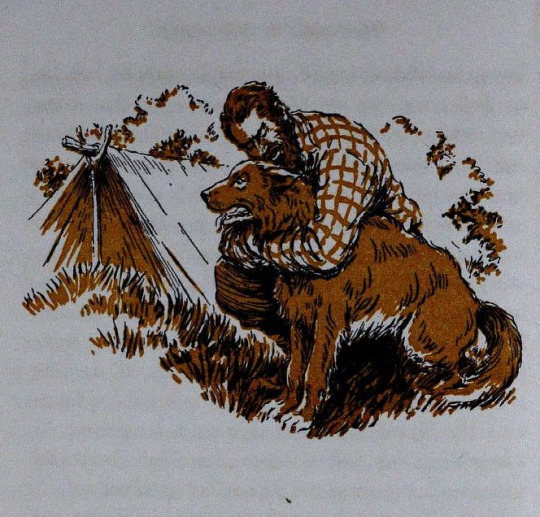
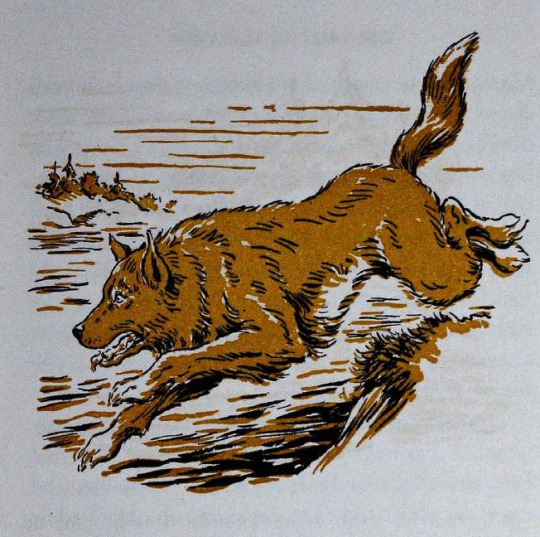


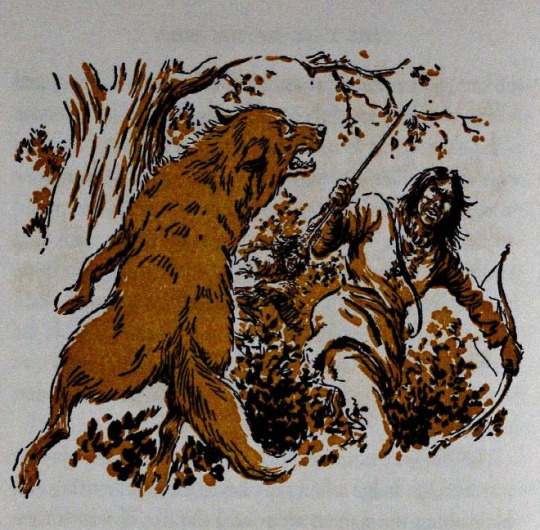

The Call of the Wild. Written by Jack London. Illustrated by Robert Todd. 1960 Macmillan Company edition.
449 notes
·
View notes
Photo

🦌 A history of land mammals in the western hemisphere New York, The MacMillan Company, 1913.
19 notes
·
View notes
Text
Chapter 5, Apollo and King Admetus

Whoever won the affections of Jupiter was sure to be persecuted by "cruel Juno's unrelenting31 hate," as the poet Virgil says; but this did not hinder the ruler of the gods from leaving very often the marble halls of Olympus to wander, in some disguise, about the earth. It was after such an absence that the watchful Juno learned of Jupiter's love for fair-haired Latona, goddess of dark nights. As this new rival was not a mortal maiden who could be punished with death, the wrathful queen was forced to be content with banishing the goddess forever from Olympus, and compelling her to live upon the earth. Not satisfied with this, she decreed that any one who took pity on the unhappy goddess, or gave her any help, would incur the lasting displeasure of Juno.
For days and nights Latona wandered, not daring to ask for food or shelter, since all men knew of Juno's decree. She slept at night in some spot where the trees offered protection from wind and rain, and her only food was the scanty store that she could gather by the way—berries, nuts, wild honey, and sometimes bits of bread dropped by children in their play. One day, being very thirsty, she stopped beside a clear pool to drink; but some reapers who were passing by saw her, and hoping to gain favor with Juno they stepped into the pool and stirred up the water into such muddiness that poor Latona could not drink. Angered by such uncalled-for cruelty, the goddess prayed to Jupiter32 that these wicked men might never leave the spot where they were standing. Jupiter from his throne in the high heavens heard her prayer, and in answer he turned the reapers into ugly green frogs and bade them stay forever in the muddy pool. And ever afterward when men came upon slimy ponds, where rank weeds grew and the water oozed from muddy banks, there they found the blinking frogs—even as Jupiter had willed.
After wandering some miles further Latona came at last to the seashore and here she begged Neptune, "the god who shakes the shores," to come to her aid, for she knew that Juno's power did not extend to the ruler of the sea. Seeing her distress, and pitying the poor persecuted goddess, Neptune sent her a dolphin, who took her on his back and swam with her to the floating island of Delos, which the kindly sea-god had caused to appear out of the depth of the ocean. Here Latona landed, and was for a time content; but the rocking of the island soon grew unbearable, and she begged the aid of Neptune a second time. He obligingly chained the island to the bottom of the Ægean Sea, and Latona had no further cause for complaint. On this island were born her two children: Apollo, god of the sun, and Diana, goddess of the moon.
When the children were grown, Jupiter took33 them to Olympus, though not without much protest from the ever-jealous Juno. The young Apollo's beauty and his skill in music gained him great favor among the gods, and found him worshipers in every town and city throughout the land of Greece. So conscious of his power did Apollo become, that he sometimes dared to assert his authority, unmindful of the will of Jupiter; and on one occasion he so angered his divine parent that he was banished to the earth, and made to serve Admetus, king of Thessaly.
In spite of his disgrace, Apollo managed to cheer his lonely hours of labor with his music; and as his work was no more difficult than to care for the king's sheep, he had abundant leisure to play upon his lyre while his flocks grazed on the sunny hillsides. As soon as he touched the strings, all the wild things in the forest crept out to hear. The fox came slinking from his hole among the rocks, and the timid deer drew close to the player and stayed beside him, listening. The strains of the wonderful music were carried across the meadows, and the mowers stopped their work, wondering where the player might be. One day they brought word to the king that some god must be among them, for no mortal could produce such music as they had heard. So Admetus sent for the shepherd, and when the youth stood before him, he marveled34 at his great beauty, and still more at the golden lyre that Apollo held in his hand. Then when the young musician, in obedience to the king's command, began to play, all those who heard him were filled with wonder, and felt sure that a god had come to dwell among them. But Admetus asked no questions, only made the youth his head shepherd and treated him with all kindness.
Though a god, and no true shepherd, Apollo served the king faithfully, and when, at last, his time of service was over and Jupiter called him back to Olympus, Apollo, wishing to show some favor in return for the king's kindness, begged for Admetus the gift of immortality. This request the wise Jupiter granted, but only on the condition that when the time came for the king to die, some one could be found to take his place. Apollo agreed to these terms, and Admetus, knowing the conditions on which the gift was made, accepted his immortality gladly. For a time all went well; but the inevitable hour came when the Fates decreed that Admetus's life was ended, and that he must go the way of all mortals unless some one would die in his stead. The king was much beloved by his people; but no one's devotion to his sovereign was great enough to inspire him to make the needed sacrifice.
Then Alcestis, the beautiful wife of Admetus, learned of the price that must be paid for her35 husband's immortality and gladly offered her life in exchange for the king's. So, in all her young grace and beauty, she went down into the dark region of Hades, where no sunlight ever came and where her joyous laughter was forever hushed in the silence that reigns among the dead. Thus Admetus gained immortality; but his happiness was too dearly bought, for as the days went by he mourned more and more for his beautiful young wife, and in his dreams he saw her walking like a shadow among the grim shapes that move noiselessly in the silent halls of death. Bitterly he repented of his selfishness in accepting the sacrifice of her life, and his immortality grew hateful to him since each day only added to his sorrow. So he prayed to Apollo to recall his gift, and to give him back his wife Alcestis. It was not in the power of that god to change a decree of Jupiter's; but the Ruler of all things looked down from heaven, and, seeing the great grief and remorse of Admetus, he withdrew the gift that had cost the king so dear, and sent Hercules to the kingdom of Pluto with commands to let Alcestis go. Very gladly the god carried this message to the gloomy realm of Hades, where amid the myriad shadow-shapes he sought and found Alcestis; and out of the dreadful darkness in which she walked alone, Hercules led her back to earth again.9
#stories of old greece and rome#emilie kip baker#out of the northland#the macmillan company#1913#all rights reserved#copyright 1913#norwood press#J.s cushing co.#berwick & smith co#in the beginning#chapter I#chapter 1#page#saturn#cronos#rhea#cybele#ops#jupiter#jove#zeus#juno#hera#here#minerva#pallas#athene#brexiiton#maraia miller
4 notes
·
View notes